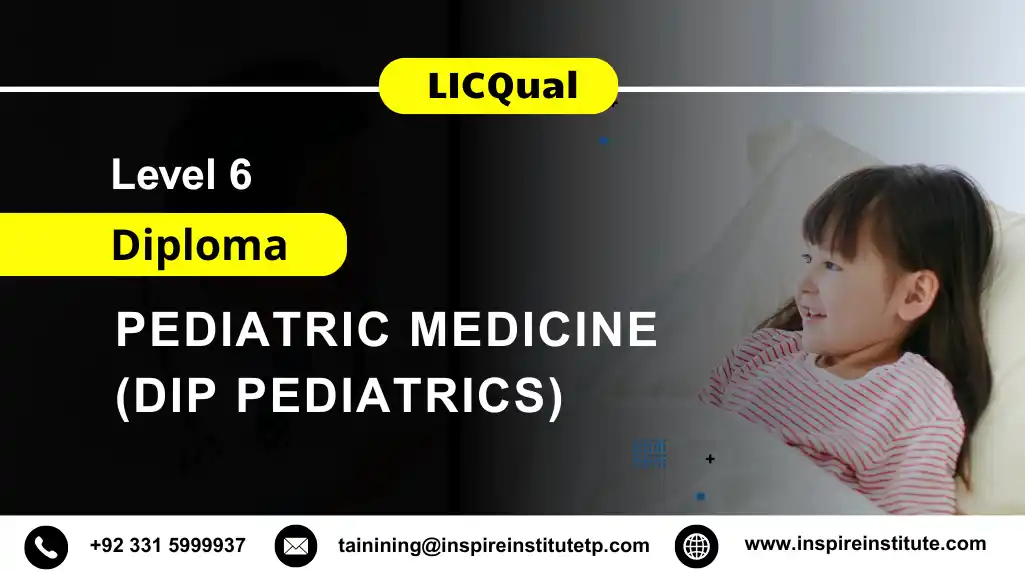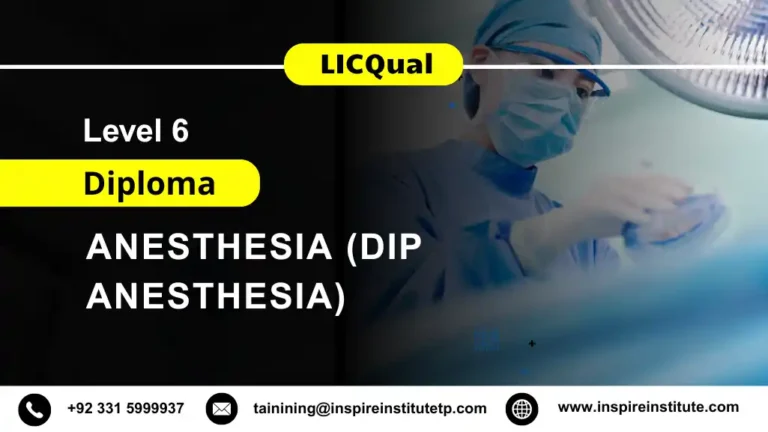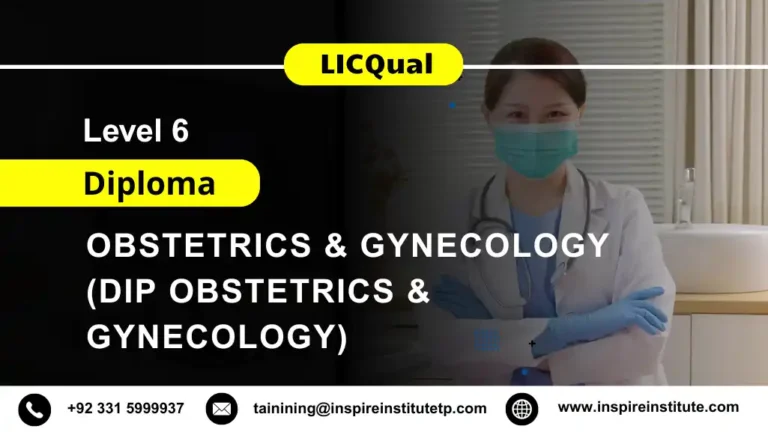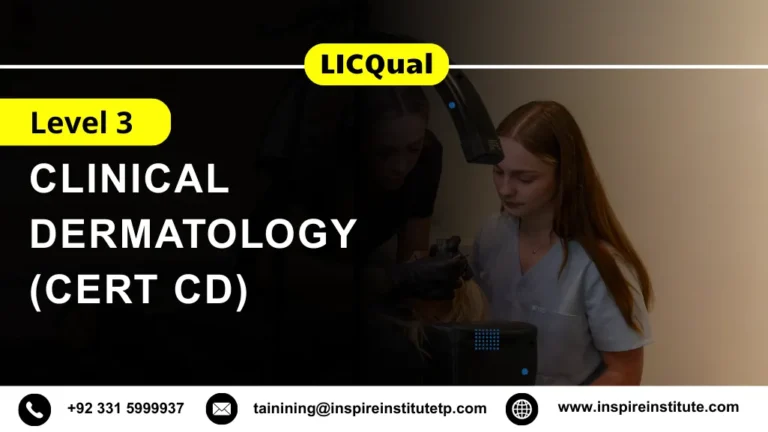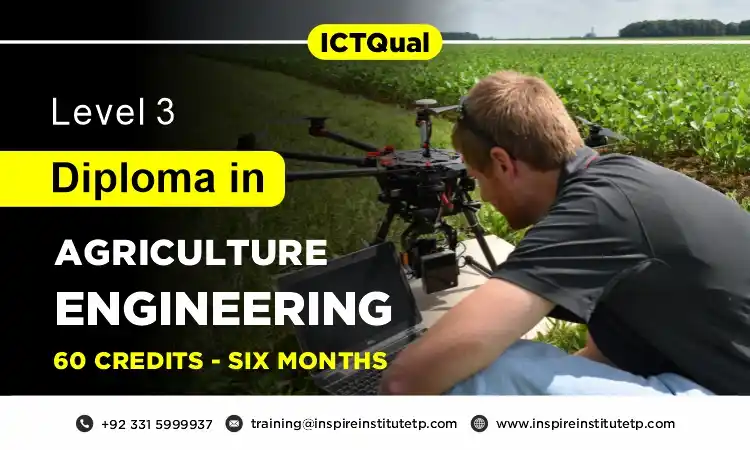LICQual Level 6 Diploma in Pediatric Medicine (Dip Pediatrics)
The LICQual Level 6 Diploma in Pediatric Medicine (Dip Pediatrics) is a UK-accredited qualification designed for healthcare professionals, pediatric nurses, and medical practitioners who aspire to specialize in child health and pediatric care. This advanced program provides a comprehensive understanding of the medical, psychological, and developmental aspects of children from infancy through adolescence, preparing learners to deliver high-quality, evidence-based pediatric care across diverse healthcare settings.
Pediatric medicine is a vital branch of healthcare that focuses on diagnosing, treating, and preventing illnesses in children. This Diploma in Pediatric Medicine equips learners with in-depth knowledge of pediatric physiology, immunology, growth, and development. The course explores common and complex childhood diseases, neonatal medicine, and preventive health measures essential for ensuring child well-being and development.
The LICQual Level 6 Diploma in Pediatric Medicine (Dip Pediatrics) emphasizes practical learning through assignment-based assessments that promote analytical thinking and clinical decision-making. Learners gain the ability to interpret clinical data, evaluate pediatric health indicators, and design effective treatment and prevention strategies tailored to pediatric patients’ needs.
This program also highlights the importance of ethical practice, communication, and empathy in pediatric care. Professionals will develop skills in engaging with children and families sensitively, understanding the psychosocial aspects of childhood illnesses, and applying evidence-based practices to improve healthcare outcomes.
Why Choose this Qualification
The LICQual Level 6 Diploma in Pediatric Medicine (Dip Pediatrics) is an internationally recognised UK qualification that offers an exceptional opportunity for healthcare professionals to specialise in child and adolescent medicine. This comprehensive, assignment-based course is tailored for doctors, nurses, and health practitioners who aim to enhance their expertise in paediatric diagnosis, treatment, and holistic child health management. It integrates theoretical understanding with practical applications, empowering learners to provide safe, effective, and compassionate care for children.
The diploma not only strengthens clinical competence but also develops leadership and analytical skills that are vital in paediatric healthcare. Whether you are pursuing a career in clinical paediatrics, research, or healthcare management, this qualification provides a robust foundation aligned with global health standards and professional excellence.
Key Reasons to Choose this Qualification
Comprehensive Understanding of Pediatric Health
- Gain in-depth knowledge of child growth, development, and the physiological differences between children and adults.
- Study the diagnosis and management of common and complex paediatric diseases across various age groups.
- Learn the principles of immunisation, preventive medicine, and neonatal care to ensure optimal child health outcomes.
- Understand genetic, nutritional, and environmental influences on child health and development.
Evidence-Based Clinical Practice
- Acquire skills in evidence-based paediatric medicine and learn to apply research findings in clinical decision-making.
- Develop competence in analysing case studies and using clinical data for diagnosis and treatment planning.
- Stay updated with the latest medical guidelines and protocols for paediatric care and child health management.
- Enhance your ability to evaluate and implement treatment methods that meet international healthcare standards.
Practical and Professional Skills Development
- Build essential hands-on skills for paediatric examination, diagnosis, and management of childhood illnesses.
- Learn effective patient communication strategies for engaging with children and families.
- Develop professional ethics, empathy, and cultural sensitivity in clinical practice.
- Gain competence in multidisciplinary collaboration and team-based paediatric care.
Globally Recognised Qualification
- Earn a UK-accredited diploma that strengthens your international career prospects in paediatrics and healthcare.
- Recognised by healthcare institutions and organisations across the UK and worldwide.
- Enhance your credentials for progression into postgraduate studies or specialised medical training.
- Increase your professional credibility as a qualified paediatric practitioner or medical officer.
Flexible and Accessible Learning
- Benefit from an assignment-based structure that allows you to study without interrupting your career.
- Access digital resources, expert mentorship, and online academic support throughout the course.
- Learn at your own pace with structured guidance that suits professional and personal schedules.
- Develop academic independence and research skills through guided self-learning.
Career Advancement Opportunities
- Prepare for leadership roles in paediatric hospitals, clinics, or community healthcare organisations.
- Qualify for positions such as Pediatric Specialist, Child Health Consultant, or Clinical Coordinator.
- Expand your career potential across research institutions, NGOs, and international health agencies.
- Build a professional network within the healthcare and paediatric medicine community.
Focus on Child and Family-Centred Care
- Learn to approach paediatric care with empathy, ethics, and compassion.
- Understand the psychosocial dynamics of child health and family support.
- Develop communication and counselling techniques for working with families effectively.
- Promote health awareness, education, and preventive care at community and institutional levels.
Commitment to Public Health and Preventive Medicine
- Strengthen your ability to contribute to child health promotion and disease prevention initiatives.
- Learn to design and evaluate paediatric public health programmes.
- Understand vaccination strategies, outbreak response, and community-based interventions.
- Apply your expertise to improve paediatric health outcomes globally.
In conclusion, the LICQual Level 6 Diploma in Pediatric Medicine (Dip Pediatrics) stands out as a globally respected qualification that bridges clinical expertise with compassionate care. It empowers healthcare professionals to make a meaningful difference in child health, enhances career prospects, and prepares learners to meet international healthcare standards with excellence and confidence.practice worldwide.
Course Overview
LICQual UK Awarding Body
Average Completion Time:
6-24 Months
Study Units: 6 Units
Evidence & Assignment Based
Mandatory Units
Who Should Take This Course
The LICQual Level 6 Diploma in Pediatric Medicine (Dip Pediatrics) is an advanced UK-accredited qualification designed for healthcare professionals who aspire to specialise in paediatric medicine and child health. This programme combines academic theory with clinical applications, equipping learners with the essential skills and knowledge required to diagnose, manage, and prevent childhood illnesses effectively. It offers a solid foundation in paediatric healthcare, preparing professionals to handle complex medical conditions in infants, children, and adolescents while ensuring holistic and ethical care practices.
This Course is Suitable For
Medical Practitioners and Doctors
- Ideal for licensed physicians and general practitioners aiming to specialise in paediatric medicine.
- Provides advanced clinical training in diagnosing and managing common and rare childhood illnesses.
- Equips doctors with the ability to handle neonatal emergencies, paediatric infections, and developmental disorders.
- Enhances decision-making and evidence-based practice in child and adolescent healthcare.
Nurses and Midwives
- Suitable for registered nurses and midwives interested in expanding their skills in paediatric and neonatal care.
- Strengthens clinical competencies in managing child health, growth monitoring, and early interventions.
- Develops knowledge in immunisation practices, child nutrition, and preventive paediatric healthcare.
- Prepares nurses for roles in paediatric wards, child development centres, and community health programmes.
Paediatricians and Child Health Specialists
- Designed for paediatric residents and specialists who wish to formalise their knowledge with a recognised qualification.
- Covers paediatric pharmacology, clinical assessment, and disease management strategies.
- Offers advanced understanding of complex paediatric cases, including congenital and infectious diseases.
- Encourages leadership in healthcare delivery and paediatric service improvement.
Healthcare Administrators and Managers
- Suitable for professionals managing paediatric departments, clinics, or healthcare organisations.
- Enhances the ability to design, implement, and evaluate child health programmes and policies.
- Builds managerial and leadership skills necessary for strategic healthcare planning.
- Promotes understanding of quality assurance, ethics, and patient safety in paediatric practice.
Medical Educators and Trainers
- Ideal for educators involved in teaching or training medical students, nurses, and junior doctors.
- Strengthens the ability to design effective paediatric training modules and evidence-based learning materials.
- Develops skills in academic leadership, assessment design, and competency-based education.
- Enhances understanding of global trends and research in paediatric medical education.
Public Health Professionals
- Beneficial for professionals working in child health promotion, immunisation campaigns, and community medicine.
- Builds expertise in paediatric epidemiology, disease prevention, and population health management.
- Provides tools for data analysis, programme evaluation, and public health policy formulation.
- Encourages a proactive approach to improving child health outcomes globally.
International Medical Graduates
- Designed for healthcare professionals from international backgrounds seeking UK-recognised qualifications.
- Helps align clinical knowledge and practice with international healthcare standards.
- Facilitates career advancement and eligibility for global employment opportunities in paediatrics.
- Supports adaptation to UK and global healthcare systems with emphasis on ethical and professional practice.
Aspiring Researchers in Pediatric Medicine
- Ideal for those interested in paediatric research and academic development.
- Provides knowledge in clinical research methods, data interpretation, and scientific writing.
- Encourages innovation in child health through research-led approaches.
- Prepares learners for further academic pursuits, including postgraduate or doctoral studies.
The LICQual Level 6 Diploma in Pediatric Medicine (Dip Pediatrics) is a perfect choice for healthcare professionals who are dedicated to improving child and adolescent health through specialised knowledge, clinical skills, and compassionate care. It empowers practitioners across multiple healthcare roles to deliver evidence-based solutions, enhance patient outcomes, and contribute significantly to the advancement of paediatric healthcare both locally and globally.
Course Benefits
The LICQual Level 6 Diploma in Pediatric Medicine (Dip Pediatrics) is a UK-accredited qualification developed for healthcare professionals, paediatric practitioners, and aspiring child health specialists seeking to enhance their expertise in paediatric care, child development, and clinical management. This comprehensive, assignment-based Diploma in Pediatric Medicine blends theoretical learning with practical clinical applications, equipping learners with the knowledge and competencies to provide safe, effective, and evidence-based medical care for infants, children, and adolescents. Through research-driven learning and flexible study options, this course prepares professionals to address a wide range of paediatric health challenges while promoting child well-being and development across diverse healthcare settings.
Key Benefits of the Course
Specialist Knowledge
- Gain a comprehensive understanding of paediatric anatomy, physiology, and pathology, essential for diagnosing and managing childhood illnesses.
- Explore key topics including neonatal medicine, infectious diseases, child nutrition, and immunisation programmes.
- Develop in-depth knowledge of developmental health, growth monitoring, and preventive paediatrics.
- Study areas such as clinical pharmacology, emergency paediatric care, and chronic disease management to ensure a holistic approach to child health.
- Build a solid academic and clinical foundation for advancing into specialised paediatric medical practice.
Practical Application
- Enhance your clinical competence through realistic case studies, research-based projects, and practice-oriented assessments.
- Strengthen your ability to diagnose, assess, and treat various paediatric conditions using evidence-based medical techniques.
- Gain confidence in clinical decision-making and effective patient communication with families and caregivers.
- Learn to collaborate effectively within multidisciplinary healthcare teams to ensure comprehensive paediatric care.
- Apply theoretical knowledge in real-world healthcare environments for maximum professional development.
Recognised Qualification
- Attain a UK-accredited qualification that validates your clinical expertise and knowledge in paediatric healthcare.
- Gain an internationally recognised credential that meets global medical education and professional standards.
- Increase employability across hospitals, clinics, research institutions, and community health centres.
- Open opportunities for advanced studies, medical residencies, or sub-specialisations within paediatrics.
- Strengthen your professional credibility in both local and global healthcare sectors.
Flexible Learning Pathway
- Study at your own pace with a fully assignment-based structure, ideal for working healthcare professionals.
- Access digital learning materials, expert mentorship, and online academic resources for continuous support.
- Maintain a balanced approach between career responsibilities and educational advancement.
- Benefit from a structured yet flexible learning environment designed to suit individual learner needs.
- Progress smoothly through modules while enhancing practical and theoretical competence simultaneously.
Evidence-Based Training
- Learn the latest evidence-based clinical guidelines and treatment protocols in paediatric medicine.
- Develop the ability to critically analyse and apply medical research in clinical decision-making.
- Gain expertise in evaluating paediatric data, health outcomes, and disease patterns.
- Understand the importance of research-driven care planning and outcome measurement.
- Implement validated, research-backed strategies to improve child health outcomes globally.
Career Development
- Unlock diverse career opportunities in paediatric hospitals, medical institutions, and NGOs.
- Prepare for roles such as Paediatric Practitioner, Child Health Specialist, or Clinical Officer.
- Gain eligibility for postgraduate medical training or paediatric fellowship programmes.
- Build the foundation for a career in paediatric research, healthcare policy, or academia.
- Strengthen your CV with a globally respected qualification in paediatric medicine.
Enhanced Child Health Impact
- Learn to design culturally sensitive and sustainable child health programmes for diverse populations.
- Gain expertise in preventive care, early diagnosis, and family-centred healthcare delivery.
- Acquire the ability to advocate for children’s health rights and equitable healthcare access.
- Improve the quality of paediatric healthcare delivery at community and institutional levels.
- Contribute to the development of long-term, ethical, and impactful child healthcare strategies.
Professional Growth
- Develop advanced skills in clinical reasoning, leadership, and paediatric healthcare management.
- Strengthen your research, analytical, and problem-solving abilities within clinical contexts.
- Enhance your confidence and competence as a paediatric healthcare leader and innovator.
- Gain the ability to work collaboratively in multidisciplinary healthcare settings.
- Emerge as a compassionate, reflective, and skilled practitioner committed to improving child health outcomes.
The LICQual Level 6 Diploma in Pediatric Medicine (Dip Pediatrics) equips learners with the advanced knowledge, clinical expertise, and leadership skills required to excel in paediatric medicine. This globally recognised qualification not only enhances career prospects but also empowers professionals to make a significant impact on the health, safety, and development of children worldwide.
Eligibility Criteria
The LICQual Level 6 Diploma in Pediatric Medicine (Dip Pediatrics) is a UK-accredited qualification designed for healthcare professionals, paediatric practitioners, and aspiring medical specialists seeking to enhance their expertise in child health and medical care. This assignment-based programme combines advanced theoretical concepts with practical applications, enabling learners to assess, diagnose, and manage a range of paediatric conditions effectively. The qualification aims to develop well-rounded professionals capable of providing high-quality healthcare for children in diverse clinical and community settings.
Educational Background:
Applicants should hold a recognised qualification in medicine, nursing, healthcare, or a related medical field. A Level 5 diploma or an equivalent qualification in paediatrics, healthcare management, or medical sciences is also acceptable. Candidates with international qualifications in medicine, paediatrics, or allied health disciplines will be assessed individually to ensure alignment with UK academic and professional standards.
Professional Experience:
A minimum of one year of professional experience in a healthcare, clinical, or child health setting is recommended. Prior exposure to paediatric patient care, clinical diagnostics, or community child health programmes is advantageous. However, motivated learners with a strong interest in paediatric medicine, medical research, or child development are also encouraged to apply, even if they have limited prior experience.
Age Requirement:
Applicants must be at least 18 years old at the time of enrolment. This ensures that learners possess the necessary maturity, ethical awareness, and professional responsibility required to engage effectively in paediatric medical studies and clinical applications.
Language Proficiency:
Since the programme is conducted entirely in English, applicants must demonstrate strong reading, writing, and communication skills. A minimum IELTS score of 6.0 or an equivalent qualification is recommended for non-native English speakers to ensure active participation in coursework, research activities, and academic discussions.
Technical Requirements:
Learners must have access to a computer or laptop with a stable internet connection to engage in online learning, access study materials, and submit assignments. Basic computer literacy, including research, data analysis, document formatting, and online communication, is essential for successful completion of the programme.
Required Documents:
Applicants are required to submit the following documents during the registration process:
A valid ID card or passport for identity verification.
Academic transcripts or certificates of previous qualifications.
Proof of relevant professional or clinical experience (if applicable).
The LICQual Level 6 Diploma in Pediatric Medicine (Dip Pediatrics) provides an exceptional pathway for learners to develop the advanced knowledge, clinical skills, and professional confidence needed to excel in paediatric healthcare practice and leadership roles globally.
The Qualification Process
LICQual Level 6 Diploma in Pediatric Medicine (Dip Pediatrics) follows a structured pathway to ensure learners gain comprehensive knowledge, practical skills, and professional competence in community oral healthcare.
Step 1: Self-Assessment
Learners review the entry requirements to confirm eligibility. Candidates with a background in dentistry, oral health, or public health are encouraged to apply.
Step 2: Registration
Complete the registration process by submitting required documents such as proof of qualifications, a valid ID, and payment of enrollment fees.
Step 3: Induction
An induction session is conducted to:
- Verify learner eligibility and documentation.
- Introduce study materials, learning outcomes, and assessment procedures.
Step 4: Learning and Evidence Submission
Learners complete assignments, case studies, and practical exercises demonstrating competence in public health dentistry, community oral health assessment, preventive strategies, and program planning.
Step 5: Feedback and Revision
Assessors review submitted evidence and provide constructive feedback. Learners can revise and resubmit work to meet all required standards.
Step 6: Competence Validation
Final submissions are evaluated to confirm that learners have met all theoretical and practical learning outcomes.
Step 7: Internal Quality Assurance (IQA)
The IQA team reviews the assessment process to ensure accuracy, fairness, and compliance with international standards.
Step 8: External Verification (EQA)
External verifiers validate the authenticity and quality of learner achievements.
Step 9: Certification
Upon successful verification, learners are awarded LICQual Level 6 Diploma in Pediatric Medicine (Dip Pediatrics) , demonstrating advanced proficiency in community oral healthcare and preparing them for professional growth in dental public health, preventive dentistry, and healthcare policy.

